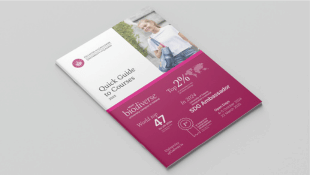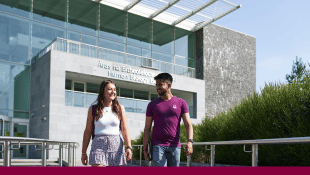Frequently Asked Questions
Click on one of the below question to see the answer.
You can apply to study in University of Galway as an Erasmus student if (1) your university has a current bilateral agreement with University of Galway in the subject area of your studies and (2) the relevant academic coordinator nominates you to take up an exchange place under the terms of this agreement. If you are unsure, the International Office of your home university will be able to advise you as to whether an agreement exists and who the coordinator is.
^ Hide answer
We regret that bilateral agreements cannot be set up in response to requests from individual students wishing to study at University of Galway.
^ Hide answer
We are sorry, but University of Galway does not accept Free Movers.
^ Hide answer
You would have the option of coming here as a fee-paying visiting student, either for a single semester or for a full academic year as part of our Study Abroad programme.
^ Hide answer
When your home university has nominated you, we will e-mail you with a link to the application form and some important information. You will also find it helpful to consult our Admission Procedures page.
Please make sure that you fill in the application form carefully, paying particular attention to your personal details and e-mail address, and that you submit it online by the relevant deadline. You may expect to receive an acceptance e-mail within a month of the deadline. At that stage, you will be invited to upload a passport photograph which we will use for your University of Galway ID card. Please don't send us your photograph until we request it.
^ Hide answer
If your area of study is Arts, Commerce/Business or Law, then you only need to complete the online application form; no transcripts are required, although you will need to complete a learning agreement. However, if your area of study is Engineering, Science or Medicine, then you will be required to submit examination transcripts along with your learning agreement, in order to allow your application and academic background to be assessed. Your home university academic coordinator will be able to advise you.
Medical students should note the following: Incoming Erasmus medical students will be required to present certification of Health Screening on arrival at the Medical School and prior to placement at University of Galway. (Information on these requirements has been sent to the relevant coordinators at partner universities; see also the relevant page on the Medical School website.) Erasmus medical students must also provide a Police Clearance Certificate from their country of origin. This is also referred to as Garda Vetting (An Garda Síochána = Ireland's national police service).
^ Hide answer
You will not be able to e-mail or fax the application form, as it can only be submitted online.
You may, however, e-mail any accompanying documentation, such as your learning agreement (to be sent to your academic coordinator) or your transcripts (if these are required). It is preferable to send these documents by e-mail, since faxing documents uses up a lot of paper and is therefore not good for the environment.
^ Hide answer
If applying for Semester 1 or Full Year: 31st May. If applying for Semester 2: 31st October.
^ Hide answer
A brief e-mail of acknowledgement will be sent to students whose applications have been received. Please check your spam/junk mail folder, as legitimate e-mails can often end up there.
^ Hide answer
We do not have a specific exam-based requirement in relation to Erasmus students’ level of English, but it is very important that you have a good command of the English language, both written and spoken, because otherwise you will almost certainly encounter significant difficulties in understanding lectures, taking part in class exercises, and in writing assignments and exams. We would suggest a minimum of Level B2 on the Common European Framework of Reference for Languages. This is a recommendation only; it is not necessary to send a certificate of English language competence with your application.
You should bear in mind that students with less than B2 level of ability in English are likely to encounter difficulty in reading and discussing academic texts with specialised vocabulary and abstract concepts. Experience has shown that such students do not do well in exams or written assessments, and often struggle throughout their study visit to keep up with the rest of the class. In large group teaching, lecturers will often not take account of or make allowances for students whose level of English is insufficient to allow them follow the course. For these reasons, and to ensure that our incoming Erasmus students have a truly beneficial academic experience at University of Galway, we would recommend that they have attained level B2, or at least that they have done intensive language preparation prior to their study visit.
^ Hide answer
No. There are a number of student residences in Galway, but these are independently run, and only Corrib Village and Goldcrest Village have any formal connection to the university. You can find information on the various residences, as well as their contact details, on our Accommodation Office website. Keep in mind that a small number of rooms in Corrib Village and Goldcrest Village will be reserved for Erasmus students and the Erasmus Team will be in touch with all nominated Erasmus students to advise them about how to apply for these.
^ Hide answer
You may need a visa, depending on the country you come from. You can find out more about visa requirements on
this link (click on “Visas”). If you do need a visa, you should request a hard copy of your acceptance letter from the International Affairs Office and apply for your visa without delay, allowing 6 – 8 weeks for your visa application to be processed. Visa applications should be made to the Irish Embassy or Consulate in the country in which you reside. If there is no embassy or consulate, you can make the application to your nearest Irish Embassy or Consulate, or directly to the Visa Office, Dept of Foreign Affairs, 13-14 Burgh Quay, Dublin 2.
^ Hide answer
Restrictions do apply. You should only select courses from the list of courses available to visiting students: you will find this by clicking on the link "Courses Available" on the left-hand menu. The courses you choose should be in the subject area of the bilateral agreement we have with your university - ask your home university academic coordinator if in doubt. In other words, if you are a Science student, then it is expected that you choose courses from the College (faculty) of Science, and not from Arts or Commerce. Only in exceptional circumstances will students be allowed to take some courses outside of the subject area of the bilateral agreement, and they will have to seek permission from the relevant School or Discipline.
The Visiting Student Handbook will show the course offerings for the current year, but these listings do not change substantially from year to year, and are therefore a good guideline. Erasmus students will not be permitted to register for any other courses that they might find, for example, on departmental websites. Please do not attempt to make arrangements with lecturers to attend courses not open to visiting students, as it will not be possible for you to register for, take examinations in, or obtain recognition for such courses.
^ Hide answer
In the first instance, we advise you to consult the relevant departmental website. There you will generally be able to find detailed information on course content. If you still have specific questions, to which answers are not available on the website, then you should contact your Erasmus academic coordinator at University of Galway.
^ Hide answer
University of Galway operates the ECTS credit system, according to which a full year’s workload is weighted at 60 ECTS credits and a single semester at 30 ECTS credits. However, University of Galway does not have a rule on the minimum number of credits to be taken by visiting students. Your coordinator at your home university should inform you of the number of ECTS credits you are expected to achieve during your study period at University of Galway, and should also advise you on the appropriate course choice.
^ Hide answer
No, the course does not carry ECTS credits and is not formally examined. It is designed to support you in developing academic English skills, and so to assist you on your academic journey at University of Galway.
^ Hide answer
We do not recommend this. One reason is the risk of timetable clashes and, consequently, examination timetable clashes. Another reason is that bilateral agreements are signed with regard to specific subject areas and there is no obligation on any of our Colleges (faculties) to accept students coming to University of Galway via a bilateral agreement that belongs to another College (faculty). This means you may not be granted permission to attend courses outside of your general subject area, particularly where there is already high demand or where there are prerequisites for entry to a particular course.
^ Hide answer
You can change your learning agreement, but bear in mind that you will be required to finalise your course choice (i.e. Course Selection, when you register for specific modules) within three weeks of the start of lectures in each semester. Once the course selection deadline has expired, no further changes will be possible, so please make sure you are 100% happy with your course choices by that date.
^ Hide answer
If you have not pre-booked accommodation in a student residence, we recommend that you arrive at least a week before term begins, in order to give yourself time to find somewhere to live. In any case, when you are making your travel arrangements please be sure that you will arrive in Galway in time to attend the Orientation Programme. Classes will commence on the Monday following the Orientation Programme, and attendance is obligatory from the start.
You will find details of Orientation on our Latest News page.
^ Hide answer
Students who don't attend Orientation are at a significant disadvantage as they miss out on important information and guidance for newly-arrived international students. Arriving late, they may also miss out on the crucial first days or weeks of classes, and this is not advisable.
^ Hide answer
We will register you as an University of Galway student before you arrive. Shortly before the beginning of term, you will receive an e-mail with information about campus online services and e-mail, and you will be required to set up these accounts before you start your studies here, using the login details that will be sent to you. All such correspondence will be sent to the e-mail address you supplied on your application form, so please ensure that (i) there are no errors in it, and (ii) you regularly check your spam/junk e-mail folder.
^ Hide answer
This may be requested when booking accommodation in a student residence. The CAO number does not apply to you as an Erasmus student: you should provide instead your NUI Galway student ID number. If you are applying for housing before we give you your NUI Galway student ID number, then you can simply write the word "ERASMUS" in place of a number.
^ Hide answer
If you are from an EU/EEA country, you can work in Ireland without a work permit.
EU/EEA countries are the 27 EU countries and Norway, Liechtenstein, Iceland and Switzerland. Students from other countries can only apply to work in Ireland if they are on a full degree course here, in other words, Erasmus students who are not EU/EEA Nationals are not eligible to take up employment in Ireland.
^ Hide answer
We are sorry, but first semester students will not be permitted to extend their stay beyond the study period for which they were originally accepted. If you wish to stay for a full year, then you should indicate this at the time of applying, in consultation with your home university academic coordinator.
^ Hide answer
You should bring your Certificate of Attendance to the International Affairs Office just before you leave and we will sign and stamp it for you with that day’s date. Please note that we cannot post-date your Certificate of Attendance – the date we insert on the document will be the date on which it is signed. This means you should call to this office with your cert no more than three days before you are due to leave Galway to return home.
We cannot sign your Certificate of Attendance after you have left Galway.
^ Hide answer
Full-year and Semester 2 students will be able to access their examination results online once they are made available via the Examinations Office website. Semester 1 students will be able to access their results via Blackboard as they become available.
If you are a full-year or Semester 2 Erasmus student, your official transcript(s) will normally be sent to the International Office of your home university in late June/early July. In the case of students who stayed for Semester 1 only, transcripts will normally be sent to their home universities in February. Transcript copies will also be issued directly to the students themselves.
^ Hide answer
Yes, but if you wish to do so, you must contact the International Affairs Office within three weeks of the issue of results. You should e-mail visitenq nuigalway.ie stating your name, ID number and the module(s) to be repeated. Repeat exams for both semester 1 and semester 2 take place in early August. We regret that alternative repeat arrangements are not possible.
nuigalway.ie stating your name, ID number and the module(s) to be repeated. Repeat exams for both semester 1 and semester 2 take place in early August. We regret that alternative repeat arrangements are not possible.
^ Hide answer













.png)
.png)
.png)
.png)


.png)

.png)

.png)
.png)

.png)
.png)
.png)
.png)
.png)
















